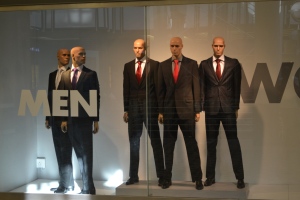
It is good for a society when the middle class is growing. Why? Because the middle class is good for society. This is what we are supposed to think.
A report from the African Development Bank (AfDB) which showed that the number of middle class Africans has tripled over the last 30 years to 326 million people was clear on this fact. The growth of the middle class is good news for the future prosperity of Africa, the AfDB states. The report indicates that by 2010 the middle class had risen to nearly 350 million people, up from about 220 million people or 27% of African’s population in 2000.
If the middle class is good for Africa, in places like South Africa, which have a past where black people where economically exploited by white people, a strong and growing black middle class is even better news. You will be happy to know then that the black middle class is burgeoning. Black Diamonds, as this group is sometimes referred to, are said to be driving economic growth. And as you can see, the news of South Africa’s black middles is part of the feel good story of Africa rising.
The most recent messenger with the news on the black middle class in South Africa is the University of Cape Town’s Institute of Strategic Marketing. The ISM has produced a report titled Four Million and Rising. The lead author of the report is Professor John Simpson.
The report claims that the black middle class has more than doubled between 2004 and 2012. To qualify to be part of this class you need an income of between R50 000 and R16 000 per month, have post-secondary qualification, a white-collar job or run a business and be younger than 44.
The above definition notwithstanding, what constitutes middle-classness is not a settled matter. In contrast to the ISM report, economist Azar Jammine has said that the middle class could be defined as those earning more than R5 000. The AfDB defines middle class those with annual income exceeding 3,900 US dollars in purchasing power parity (PPP) terms, or per capita daily consumption of $2-$20 in 2005 PPP US$.
But there are other questions. As Roger Southall stated in his paper “Political Change and the Black Middle Class in Democratic South Africa”, “the very notion of ‘middle class’ in industrialized, industrialising and post-colonial societies is problematic.”
Whatever differences exist, though, seems that money is the measure of man.
Be that as it may, the black middle class in South Africa is said to have grown from 1.7 to 4.2 million in the last eight years.

On the basis of the assumption that having more people who can buy more stuff and consume more of the resources of the earth is good, with doubt that is impressive. In rand terms, the black middle class is said to be worth R400 billion a year of spending power. Quite a packet.
This stuff is to be fêted, apparently. And many news media like the Sunday Times, Business Day, MoneyWeb, and Mail and Guardian did just that. In the Sunday Times, Adele Shevel wrote not only that the black middle class has more money in its back pocket, but, it’s spending power is more than that of “the white middle class, which only has about R320bn.” Shevel’s piece goes somewhat farther than many others in observing among other things that, even with this growth, “Whites still dominate the top-earning brackets. Only 10% of LSMs 9 and 5% of LSM 10 were black. Nonetheless, the average monthly income of black households has grown 34% since 2004 to R20,985 last year, while average white household income is up 9% to R25,115.”
In the edition of May 3 to 9, the Mail and Guardian newspaper has several good news articles on the black middle class. The longest article, by Lisa Steyn, has the heading “The black-belt economy kicks in’. Simpson is quoted in the article saying “(The growth in this segment) speaks very well for the future of the country.” There is also shorter piece, also by Steyn, with the headline “‘March of the black middle class has promising spin-offs”.
But is the black middle class of benefit for the rest of society? Simpson again: “Middle class is what stabilises and drives economy – we spend; that is the way our economy grows. It also shows a movement towards the normalisation of society. (It’s increasing South Africa’s skills base, deepening employment and widening the tax bases.”
That doesn’t quite answer the question. One might as well ask, what makes the makes the middle class better than a society of dollar billionaires? Why can’t a growing working class be as good, or better, for society if it is paid a wage commensurate with the work they do underground in the mines, producing food on the farms, cleaning our houses and looking after our children?
Mobility and convenience of getting from one point to another is of course vital for a well-functioning society. That is not the same thing as saying that a million plus cars on the road owned by black people is good news. What South Africa, and the rest of Africa, really needs is a good public transport system.
Similarly, what makes the fact that the majority of the black middle class send the children to “‘Model C” or private schools” good for society when what we have to fight for are many good, no great, public schools.
Look, I am part of this class that is celebrated so. There are things that are very good about having enough money in the house, because, be assured, whatever else is said money is the key marker of this class. I have spoken about mobility, education. It’s good to be able to be on time and get there without too much hassle. Knowledge is a virtue, my son will tell you. Money can buy both. Not virtue, it can’t.
We must add housing, food, electricity, water, and health. Recreation, books, television, movies, and art are also good for the body and soul.
Now why should the rich and middles classes have all this and not everyone else in Africa? Do the poor not like movies or are we being asked to enjoy their lack of access?
Are we being coached in loving inequality? Even the AfDB acknowledges that growth may be good, but income inequality is the problem. What we lack on this continent, certainly in South Africa, is not a middle class. Instead, we desperately need what can be called, after Ivan Illich, a convivial society. That’s a society where people are rewarded fairly for the work they do and there is adequate provision of public goods. Such a society grows out of “social arrangements that guarantee for each member the most ample and free access to the tools of the community and limit this freedom only in favor of another member’s equal freedom.” You don’t have to be Vavi if the aim of society is conviviality as defined, or in African National Congress’ election, we want a better life for all, news of a growing middle class is a decoy.
This was supposed to be a short article. The aim was to comment on black middle class men as part of this rising class of consumers. I will do that another time.
For the moment, though, let me simply say there is nothing inherently good about being a middle class African man. Being middle class does not in itself not a man good, egalitarian, democratic, or keen on economic and social justice.
I will risk the effect of repetition: Capitalism, and therefore capitalist masculinity, feeds on inequality. Capitalism enjoins us to enjoy domination over others. The public relations department of market ideology, advertisers, is employed to seduce us to aspire for spend ourselves to happiness. Everywhere you turn, on billboards on the M1 in Johannesburg, on your car radio, and on television while you are trying to fall asleep in peace, barely concealed instructions for us to desire more, shinier, cooler, newer, exclusive stuff. The market men say buy a new car, you deserve to treat yourself. Travel in luxury, you earned it. Live far away from the poor, you worked for it. You have the X-factor. You have that special quality the working class and poor don’t have.
Is this really true? Are we the chosen ones?
Likewise, patriarchy love itself some power over others. Patriarchy socializes us into a culture in which by definition men become rulers of women and children. We are supposed to enjoy controlling them, like some slave-masters, owning them. It is patriarchy, in capitalist societies, that instructs us that men must work outside the home and women must look after children. If women have to work, patriarchal ideology, in partnership with market ideology, tells us that men must earn more than women because men are superior by nature and they run families. Do you really believe that women are inferior to men? Even if that were the case why can’t women, who actually do run families, earn more than men?
The bottom line is that all this celebration of the middle class is a nice attempt to distract us from the truth that we live in unjustly unequal world and we are supposed to like it or shut up. It doesn’t have to be so.
This is written in my personal capacity and does not represent the views of my employers or any organisation I am associated with.